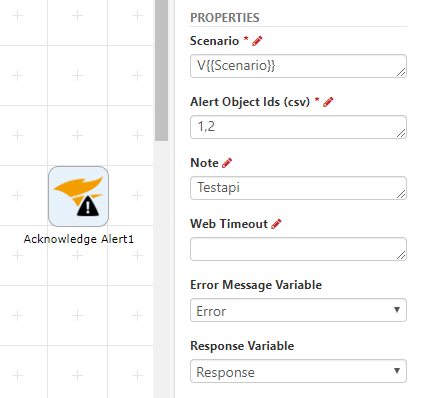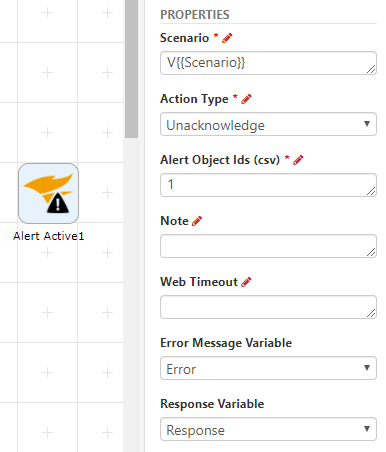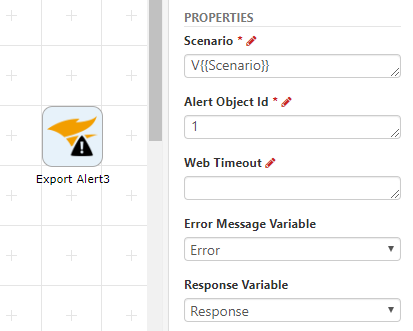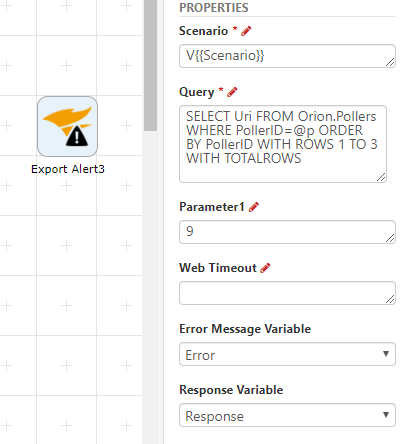# SolarWinds Connector
The SolarWinds connector interfaces with the SolarWinds Information Service using REST requests.
# SolarWinds Connector Configuration
The SolarWinds connector uses basic authentication to connect to the API endpoints. The authentication data is stored in an XML format. An example is shown below:
<connector>
<scenarios>
<scenario name="_scenario_name_" host="IP/host" username="_user_name_" password="_method3_encrypted_password_" tls="true_or_false" tls11="true_or_false" tls12="true_or_false" ssl3="true_or_false"></scenario>
</scenarios>
</connector>
Each SolarWinds action has a scenario property which needs to be given a value that matches the name attribute of a scenario defined in this XML. Multiple scenario nodes can be added to this XML configuration to allow the connector access to multiple SolarWinds environments.
The transport layer security settings can be set using a scenario. Each TLS version can be enabled by setting the attribute equal to "true" and disabled by setting the attribute equal to "false." For example to only enable TLS 1.2 the TLS attributes would be configured as such:
tls=\"false\" tls11=\"false\" tls12=\"true \" ssl3=\"false\"
Note that the attribute "tls" corresponds with TLS 1.0, "tls11" corresponds with TLS 1.1, etc.
# Connector Actions
# Acknowledge Alert

Action Function:
The "Acknowledge Alert" action sends a POST request to the following endpoint:
This request acknowledges an AlertActive entity or entities specified by the action property Alert Object Ids. This property value should be set to the AlertActive ID or a comma separated list of AlertActive IDs. The action will also set an optional note value for the entity.
Action Outputs:
Success
Failure
Action Properties:
This action, as well as the other SolarWinds actions, have 4 generic properties.
The first is the scenario property. This field value should match the scenario name attribute defined in the SolarWinds authentication XML.
The second is the Web Timeout property which specifies the number of seconds the request should be given before it times out. If the value is blank, the request will use the default timeout of the API. The Error Message Variable property will save an error message (if any) to the given variable. The Response property will save the request's response in a variable.
Scenario: The name of the scenario defined in the connector configuration.
Alert Object Ids: A comma delimited list of alert object Id's.
Note: A brief note to store alongside the acknowledge alert.
Web Timeout: How long in seconds the HTTP request is given before timing out. Leave blank to use the default timeout setting.
Response Variable: A workflow variable which will hold the response of the request. The data format is JSON
Error Message Variable: A workflow variable which will hold the error message (if any)

# Alert Active

Action Function:
The "Alert Active" action is a generic action which will send a POST request to one of a number of endpoints depending on how the Action Type property is configured. The Action Type property is a dropdown list, allowing the workflow designer the ability to set an action to perform on the AlertActive SolarWinds entity. The 4 options are Acknowledge, AppendNote, Unacknowledge, and ClearAlert. The endpoints for these actions match the below example:
Action Outputs:
Success
Failure
Action Properties:
The Alert Object Ids property is either the ID of a single AlertActive or a comma separated list of AlertActive IDs. Like the "Acknowledge Alert" action, this action has a Note property which gives the workflow designer the ability to define a note for the AlertActive entity. Choosing the Acknowledge Action Type property value will cause this action to mimic the behavior of the Acknowledge Alert action.
Scenario: The name of the scenario defined in the connector configuration.
Action Type: Defines the action take on the alert (Acknowledge, AppendNote, Unacknowledge, Clear Alert).
Alert Object Ids: a comma delimited list of alert object Id's
Note: A brief note to store alongside the acknowledge alert.
Web Timeout: How long in seconds the HTTP request is given before timing out. Leave blank to use the default timeout setting.
Response Variable: A workflow variable which will hold the response of the request. The data format is JSON
Error Message Variable: A workflow variable which will hold the error message (if any)

# Export Alert

Action Function:
The "Export Alert" action exports an alert so that the entity can be backed up, transferred to another environment, or programmatically modified. The action sends a POST request to the endpoint:
Action Outputs:
Success
Failure
Action Properties:
This action has a property for a single Alert Object ID.
Scenario: The name of the scenario defined in the connector configuration.
Alert Object Ids: A comma delimited list of alert object Id's.
Web Timeout: How long in seconds the HTTP request is given before timing out. Leave blank to use the default timeout setting.
Response Variable: A workflow variable which will hold the response of the request. The data format is JSON
Error Message Variable: A workflow variable which will hold the error message (if any)

# Query

Action Function:
The "Query" action sends a POST request to the endpoint:
https://host:17778/SolarWinds/InformationService/v3/Json/Query (opens new window)
This action runs the specified SQL query (defined via the Query property) with the given parameter (Parameter1 property) on the SolarWinds instance.
Action Outputs:
Success
Failure
Action Properties:
Scenario: The name of the scenario defined in the connector configuration.
Query: A SQL query configured to return a custom search.
Parameter1:
Web Timeout: How long in seconds the HTTP request is given before timing out. Leave blank to use the default timeout setting.
Response Variable: A workflow variable which will hold the response of the request. The data format is JSON
Error Message Variable: A workflow variable which will hold the error message (if any)
